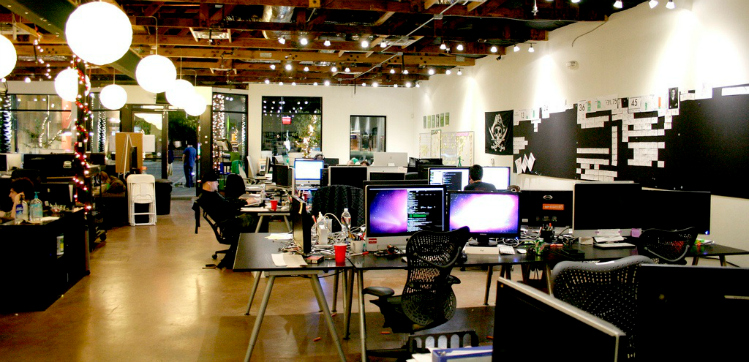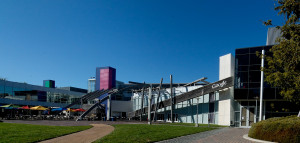
First we had hunting, then farms, then factories.
Then there were offices, with their doors and thick walls. Then cubicles, thinner and shorter walls and no doors.
Today, no more walls. No more doors. Want a picture of your kid on your desk? Better set it as your computer background. Because that chair is up for grabs tomorrow morning, pal. We all belong everywhere and nowhere in the cafeteria of modern work. We live in a strange new world. Your digital desktop is more permanent than your actual desktop.
The open-office trend has staked its claim on the modern workplace. Low- or no-partition workspaces make up about 70 percent of U.S. offices, according to the International Facility Management Association.
Last year, an essay in The Washington Post made a splash by rallying against the open-office style. The piece, “Google got it wrong. The open-office trend is destroying the workplace,” triggered more than 700 comments and more than 22,000 social shares.
In the piece, Brooklyn-based writer Lindsey Kaufman tells the story of her New York ad agency switching to the open office trend.
“After nine years as a senior writer, I was forced to trade in my private office for a seat at a long, shared table. It felt like my boss had ripped off my clothes and left me standing in my skivvies,” Kaufman wrote.
Kaufman blames Silicon Valley for ushering in the trend and the rest of corporate America for blindly following suit. She talks about all the new distractions and noise and lost productivity. And sure, there’s research to back it up. Research that shows open offices hurt productivity and that privacy boosts job performance.
Here’s the real problem with the open-office trend: we’ve blindly accepted that what’s good for the Google is good for the gander. Google’s doing it? They’re super successful and fun — let’s ALL do it. Now, a backlash is welling up that promises to be just as hasty and one size fits all as the original trend.
Google didn’t get it wrong. They got it right for Google. Here’s why.
Google’s culture (and many of the other tech giants celebrating the open-office trend) is famously engineer-centric. The company over the years has fought to keep the culture with a by-engineers-for-engineers feeling.
Not only are most of Google’s boots on the ground employees writing code, they’re some of the world’s best at it. These are focused, brilliant people doing what they do best. These are the kids who reminded the substitute teacher to assign homework — they can be trusted with a little less supervision.
Also, the very nature of software development lends itself better to this style of work. And the nature of most people drawn to development lends itself better to this style. People drawn to development value analytical, systems-based thinking and a calm environment. Put in a vacuum, they will maintain this environment.
It’s us other workers — those pesky sales and marketing types — who screw it up. We couldn’t Fizzbuzz our way out of a death sentence, but we can strike up a conversation with anybody and everybody. Put us all in a room without partitions, and that’s exactly what we’ll do.
Or consider this excellent take on the idea from this Reddit commenter:
“In a dev only environment it can work, I found that devs respect the need for a quieter environment but I had a job where they put engineers in between sales and marketing; the sales and marketing were constantly loudly socializing and I found it absolutely impossible to focus. If devs are talking quietly I can tune that out, but some loud talking sales guy or a few marketers chattering drives me right up the wall and I become useless.”
Google didn’t built the world’s most famous work culture by copying someone else. They found inspiration by understanding who their workers are and building a system that works for them.
If your business builds an environment optimized for someone else’s workers, you’re doomed to failure. And you’re getting it all wrong.
P.S. If you liked this article, you should subscribe to our newsletter. We’ll email you a daily blog post with actionable and unconventional advice on how to work better.
